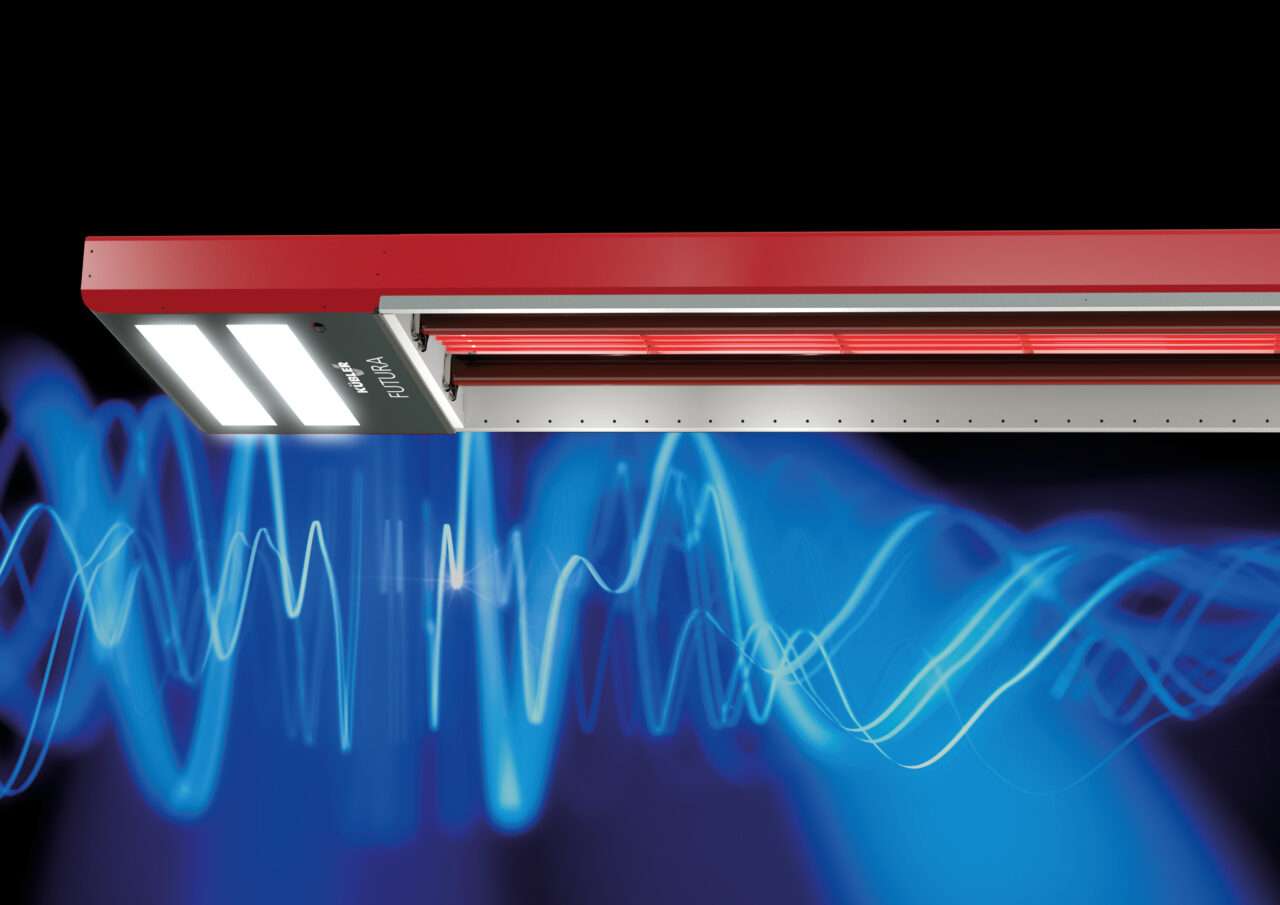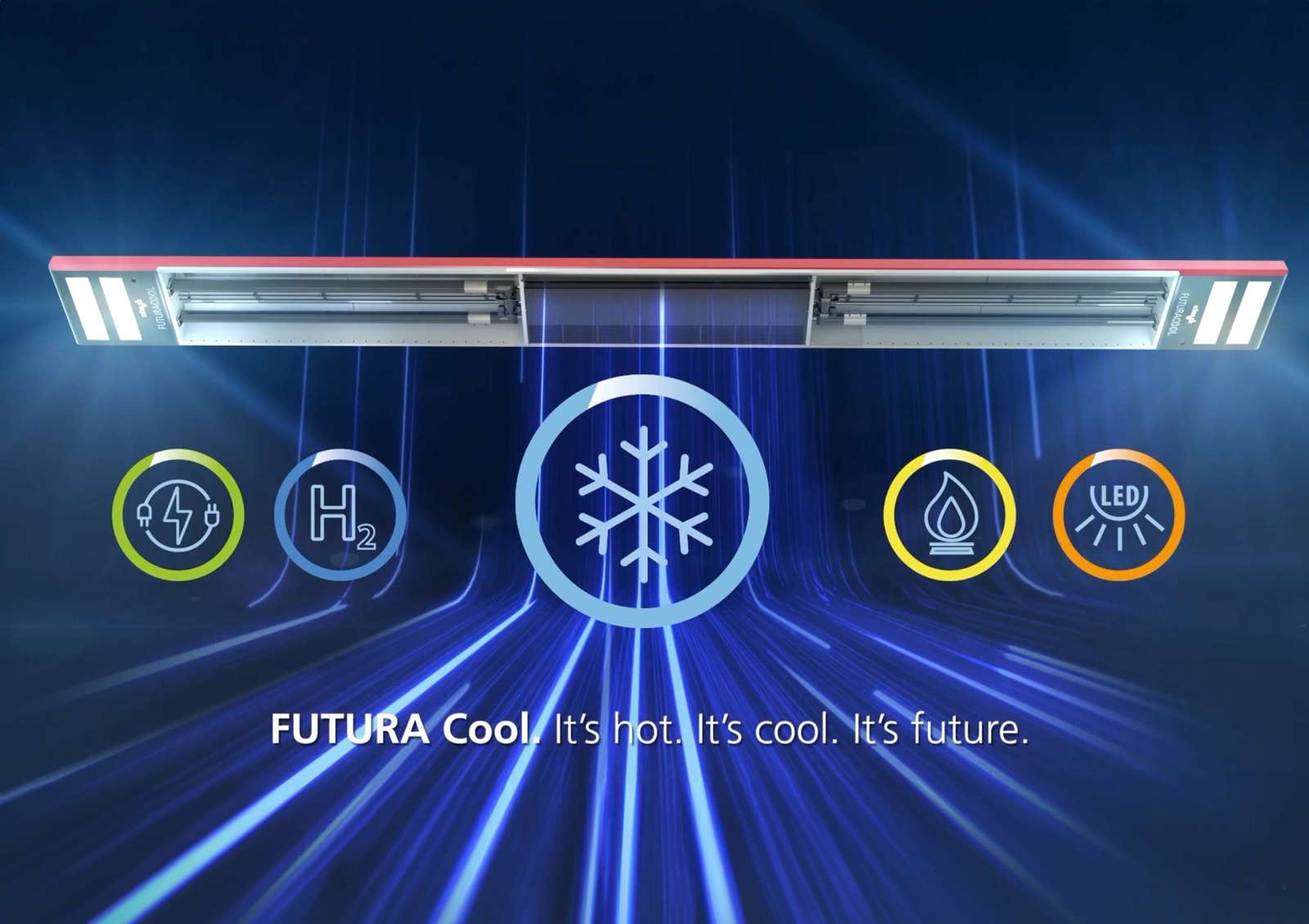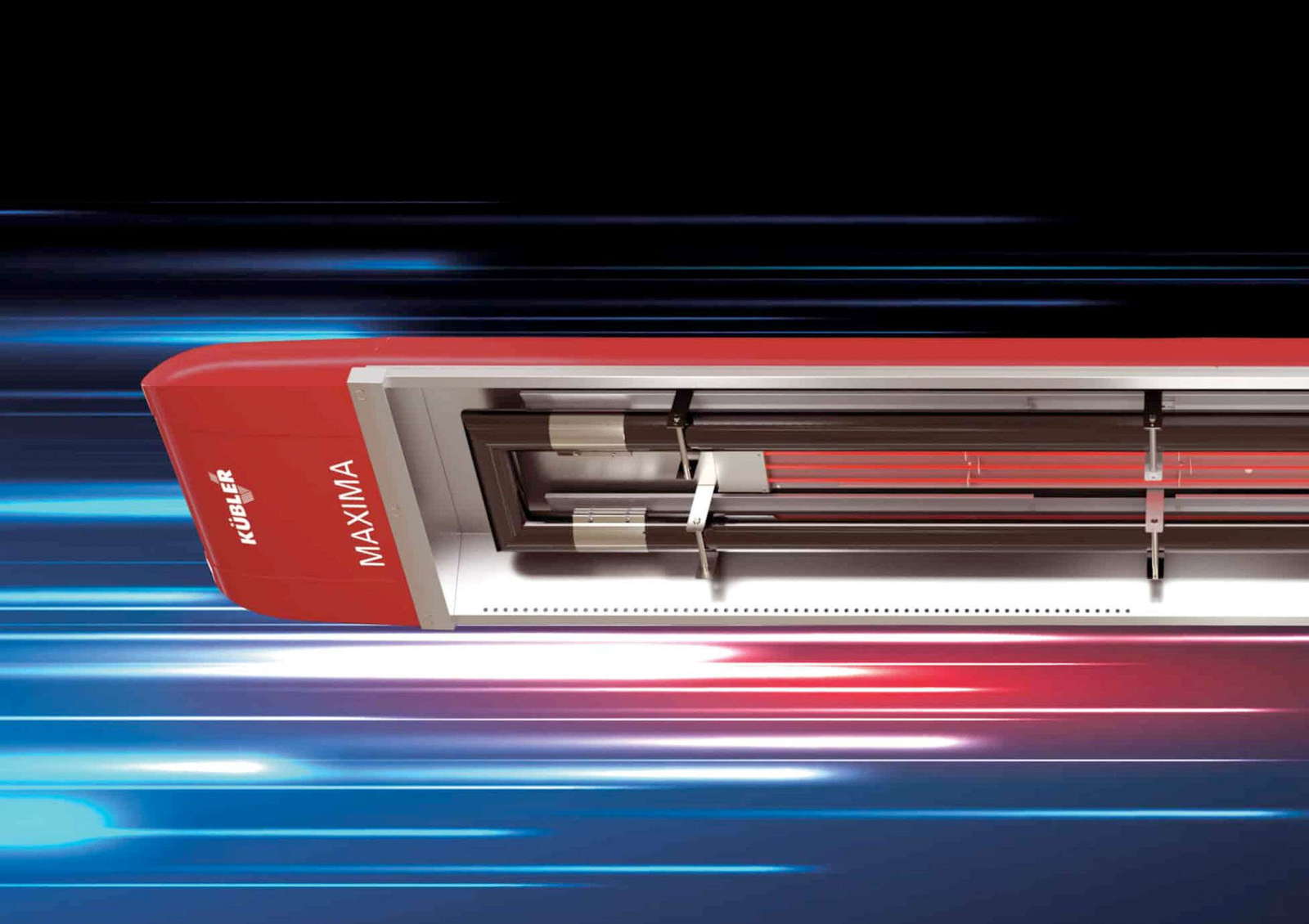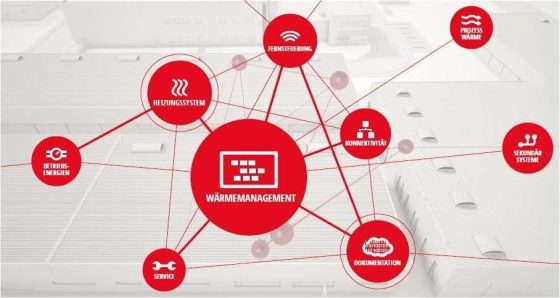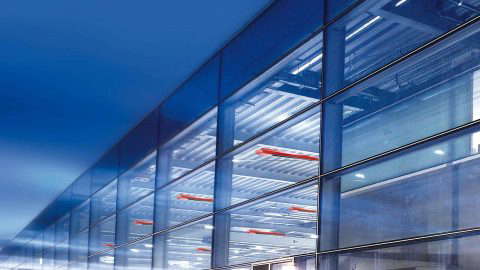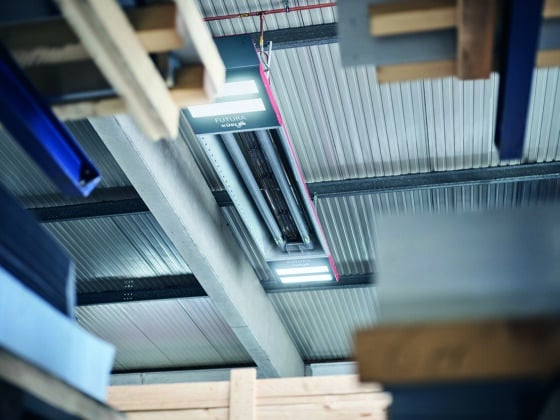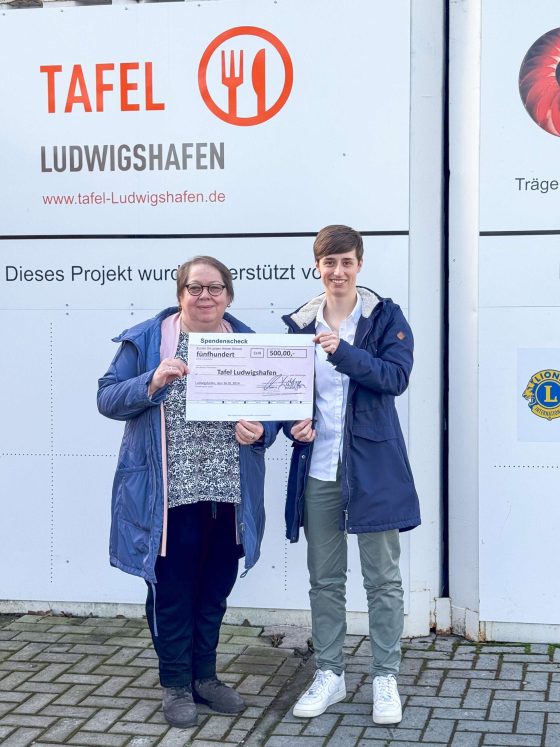Green members of the state parliament Dr. Bernhard Braun and Fabian Ehmann at KÜBLER in Ludwigshafen
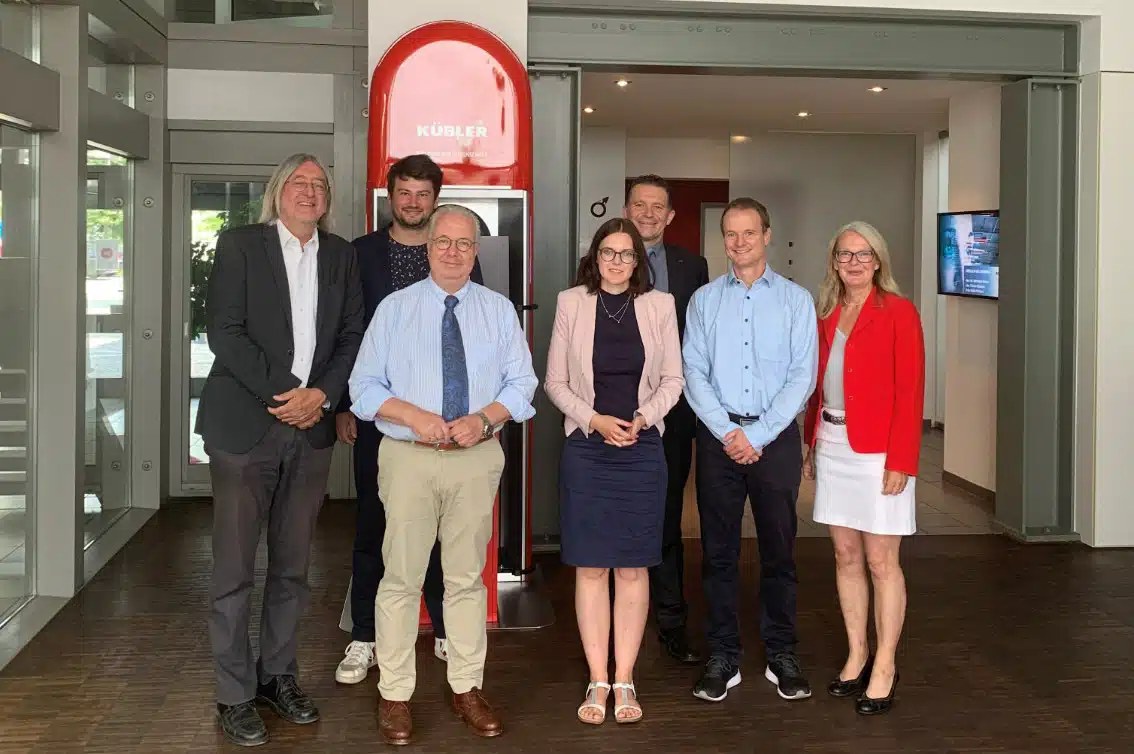
(from left to right) Dr. Bernhard Braun, Fabian Ehmann, Thomas Kübler, Hanna Thiele, Kim Henrich, Dr. Jens Findeisen, Christine Kübler at KÜBLER's main site in Ludwigshafen. (Source: KÜBLER GmbH Energiesparende Hallenheizungen)
"Halls are not kindergartens," was the first thing the visitors learned. This sounds trivial, but it is crucial when choosing a heating system. Because there is a difference of up to 40 m in ceiling height alone between the two buildings. Not to mention the size of the usable area - which can be up to 10,000 m² or more in the case of hall buildings. These "large rooms" pose completely different challenges in terms of heating than the so-called multi-storey buildings with clear heights of 2.50 m.
The fact that this difference is so little known in politics is due to the traditional distinction in legal texts between "residential buildings" and so-called "non-residential buildings". The latter also include offices, hospitals and daycare centers - except that they do not differ from residential buildings in terms of floor height and can generally be treated completely the same in terms of heating.
Halls (also known as "non-residential buildings in non-storey construction") have to be heated in completely different ways. With their high ceilings, the heat rises in the form of warm air to a height of 10, 20 or 40 m - to where nobody is working and needs the heat. This is incredibly ineffective and costly. Heat pumps for the operation of hot water-based heating systems are technically unable to cope with the physical building requirements of halls. They cannot react flexibly to the dynamic usage requirements in manufacturing or logistics operations, for example. And: they block the hall floor for every new machine installation or hall change of use.
"You can't transport 38 tons of steel with a Smart," says Thomas Kübler, Managing Partner and founder of KÜBLER GmbH. "In other words, what is well suited as a panacea for new residential buildings does not work to the same extent in industry."
In political statements, however, heating systems for halls and heating systems for multi-storey buildings are usually lumped together. This attitude has put the industry of hall heating manufacturers and also KÜBLER on high alert. "It is important to understand that changing laws does not also influence physics," says Kübler. If changes are now made to the GEG and BEG, this will affect a new political decision-making level that has little knowledge of the knowledge transfer of the last 10 years. There is a great danger that high-efficiency technologies that could reduce gas consumption in Germany's halls by up to 70 % in the short term will be excluded from the legislation. Technologies that can be operated not only with biomethane but also with green hydrogen have already been certified and are available. Kübler adds that something else needs to be considered when looking at gas-powered heating systems: "Green hydrogen is a gas."
"We are addressing a highly relevant market for climate targets and the energy transition. 15 % of the total thermal energy demand of buildings in Germany and the associated greenhouse gas emissions are caused here, although this market only accounts for 2 % of the total building stock," says Dr. Jens Findeisen, Head of Development at KÜBLER. KÜBLER's development work focuses primarily on energy efficiency and secondarily on substituting gas as an energy source, which must come from renewable sources. Where renewable energies are available, systems from the innovation leader can reduce CO2-emissions by almost 80 % today.
Findeisen believes it is more important than legislative changes that important research funding is finally made available again so that the technical challenges of the energy transition can be solved. Since the new legislative period, these research funds are no longer available for SMEs and universities for cooperation projects. As a result, all research institutes are losing scientific staff - Germany's largest institute for energy economics, for example, has now been reduced by half. This vacuum is not only damaging SMEs as drivers of innovation, but is also jeopardizing Germany as a location for innovation in the medium term.
"Before I came here, I wasn't aware of the difference between heating technology for halls and heating systems for multi-storey buildings. But once you've heard that, it's completely clear," says Fabian Ehmann at the end of the visit. "It's clear that we need a completely different approach here. I also see that a lot can be achieved relatively quickly in the indoor segment with a relatively manageable number of market participants - namely saving a lot of gas." Tackling this goal together is one of the plans with which visitors and hosts bid farewell to each other.
KÜBLER specializes in energy-saving heating for the hall building segment. For over 30 years, the company has been regarded as an innovation leader, winning prestigious awards such as the Innovation Prize of the Federal Ministry of Economics, the German Sustainability Prize, the Bavarian State Prize, the Rhineland-Palatinate Innovation Prize, the Energy Efficiency Award and a nomination for the IKU Climate and Environment Innovation Prize. Solutions from the Ludwigshafen-based hidden champion achieve savings of 30 - 70 %, which have a direct impact on reducing energy costs and CO2-emissions.
About KÜBLER:
KÜBLER GmbH is an internationally active group of companies and is regarded as a pioneer and innovation leader in modern infrared heating technology. The core business is the development and production of highly efficient premium technologies for energy-saving and climate-friendly hall heating. KÜBLER offers an exceptionally wide range of products for almost all types of halls and room environments. The core portfolio consists of energy-efficient infrared heating technologies, control systems and integrated heating systems, supplemented by a wide range of services and the offer of rental solutions ("heat-as-a-service") under the name "HeizWerk".
KÜBLER products and development services regularly receive awards. National and international prizes include the Federal Prize for Outstanding Innovative Achievements from the Federal Ministry of Economics, the Bavarian State Prize, the German Sustainability Prize and the Innovation Prize from the state of Rhineland-Palatinate. KÜBLER is one of the Hidden Champions in the Palatinate 2021 and has been nominated for the IKU - The Climate and Environment Innovation Award of the Federal Ministry for Economic Affairs and Climate Protection in 2022.
Contact/contact person:
Christine Kübler
Marketing | Communication
KÜBLER GmbH - Energy-saving hall heating systems
Am Bubenpfad 1A
67065 Ludwigshafen
Phone: +49 621 / 57000-16
Fax: +49 621 / 57000-57
marketing@kuebler-hallenheizungen.de
- High halls - high energy consumption. It's worth taking a closer look. If you want to know where energy is being wasted, you need transparency. A clear view of whether and where heat is being wasted and thus causing unnecessarily high costs and emissions. By leaving hall doors open for too long, for example. By heating unused hall areas. Or through suboptimal heating times. A smart tool from the hall heating specialist KÜBLER now provides clarity: the EMMA heat management system, which ensures reduced costs, less CO2 and greater efficiency in industrial heating processes.
- The old hall heating system consumes too much energy, emits too much CO2 and is becoming increasingly unreliable. Good reasons to finally tackle heating modernization and replace the old system with a modern, energy-efficient one. But the expense seems high and is often shied away from. Yet today there are alternative solutions that can also be very interesting economically.
- The hall heating specialist KÜBLER GmbH has been nominated in the "Premier" category for the "Großer Preis des Mittelstands" 2024. Another great success for the medium-sized, innovation-driven company based in Ludwigshafen am Rhein.
- Ludwigshafen, January 2024: The food bank in Bayreuther Straße is delighted to receive a donation cheque from the employees of KÜBLER, the specialist for energy-saving hall heating systems. They not only wanted to use the Christmas party to bring the old year to a cheerful close together with the entire workforce, but also to think about people who need support. To this end, they organized a raffle with over 100 prizes, including an iPhone as the main prize, which was provided by the company. This raised almost 500 euros. The food bank is delighted.
